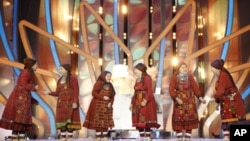A group of grandmothers has been chosen to represent Russia at the Eurovision song contest in Baku, Azerbaijan.
Wearing traditional peasant clothing, an amateur group of grannies took to the stage in Moscow, winning the country’s place at Eurovision, an annually televised event watched by more than 100 million people.
Watch their winning performance on You Tube
The eight ladies beat 24 other entries, including a double act with a pop star and 2008 Eurovision winner, Dima Bilan.
The grandmas (known as "babushkas"), with an average age of 75, surprised and wooed the crowd with their catchy tune in Udmurt and English called, “Come On and Dance.” The ladies are from a remote village called Buranovo in Russia's Republic of Udmurtia.
Udmurt is a distant relation to the Finnish-Ugric language. It is spoken by more than 500,000 people.
The grandmas swayed, smiled and danced in their red, green and white costumes, pleasing the crowd, who clapped and danced along.
Russian TV Host Olga Shelest announced the Buranovo Grannies win on national television, saying they might have to start marketing themselves more. She said they are basically just beginning artists. Because they are not touring much, she says they are not on TV too often, and she is not sure if they have 10 music videos for rotation on music TV channels.
This does not seem to bother Moscow resident Viktoria, who preferred not to use her last name. She thinks the elderly ladies represent the real Russia. She said they have a chance to win because their act is very traditional. She says Russian culture should not be forgotten.
Sixty-nine-year-old Galina Georgiyevna also thinks the grannies have a chance to win the popular contest. She said she thinks there is a chance, not a big one, but that there is a chance. Babushkas have started entering the arena despite their age. This is good, she says.
The ladies say if they win, they plan to build a church in their small town.




